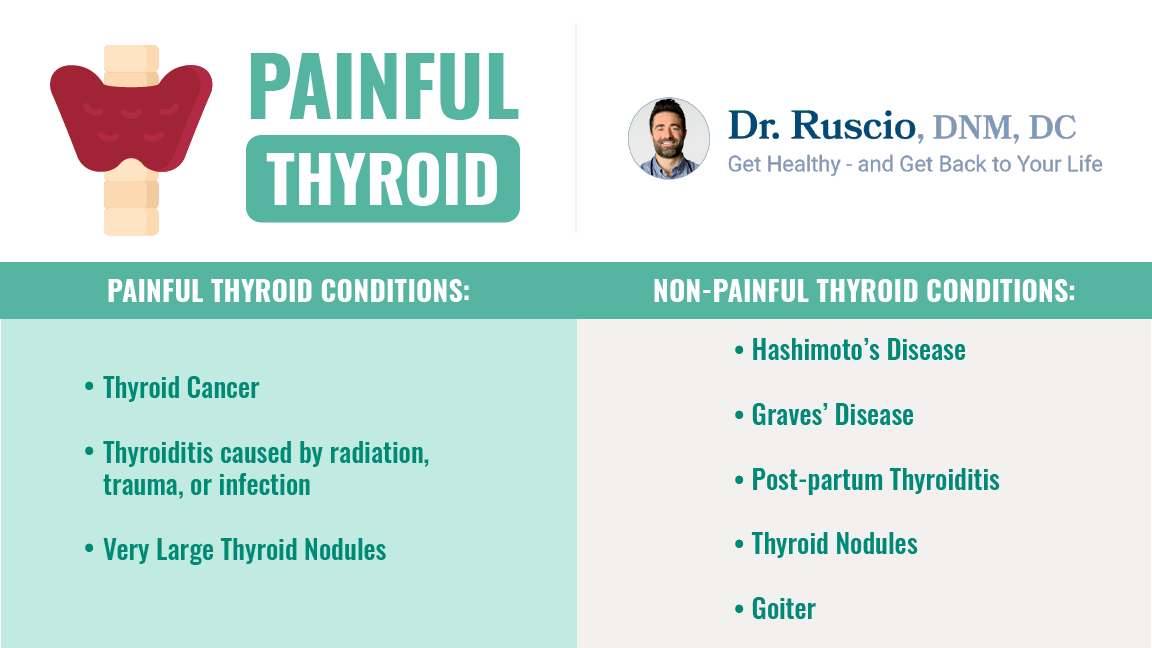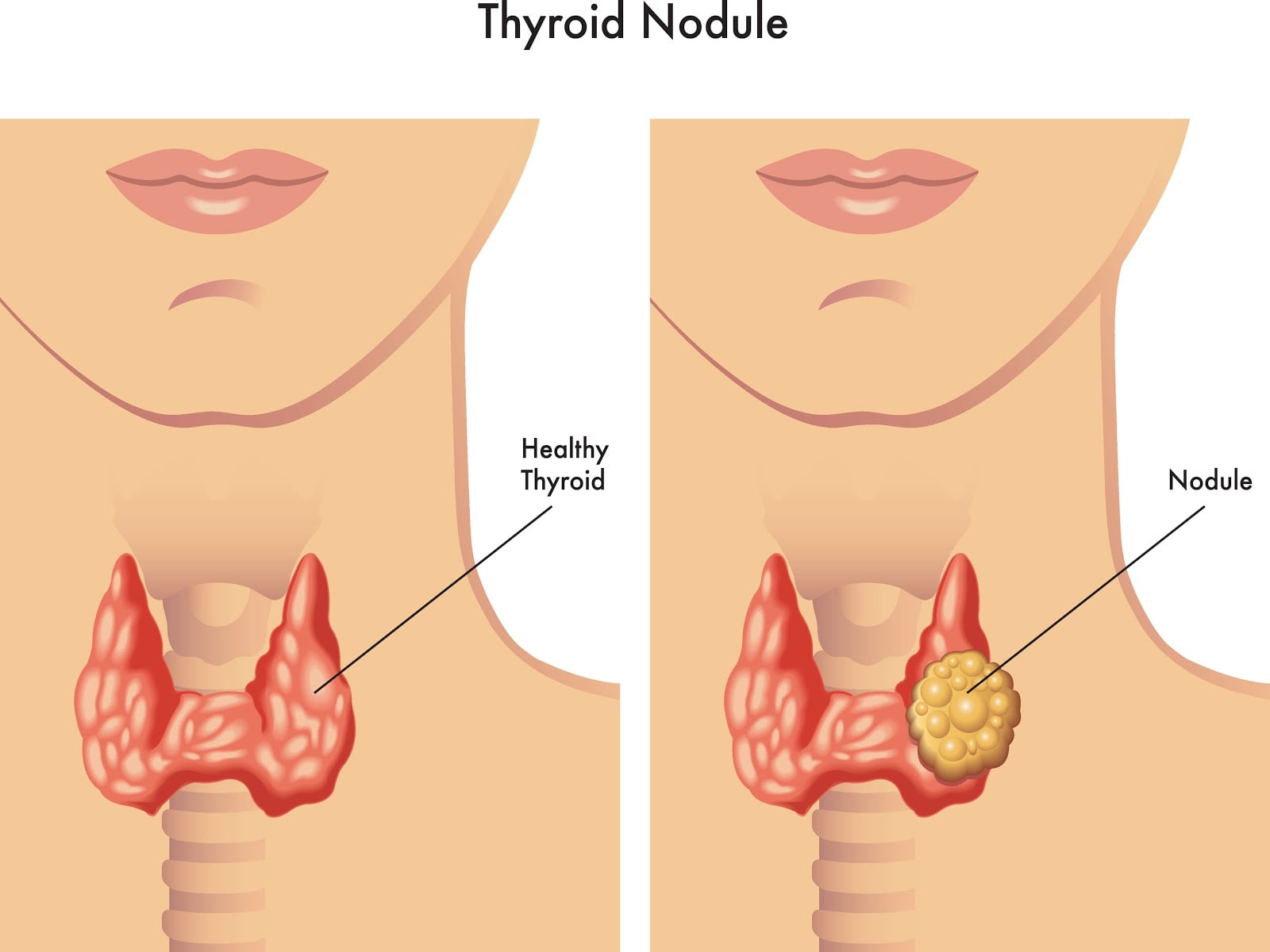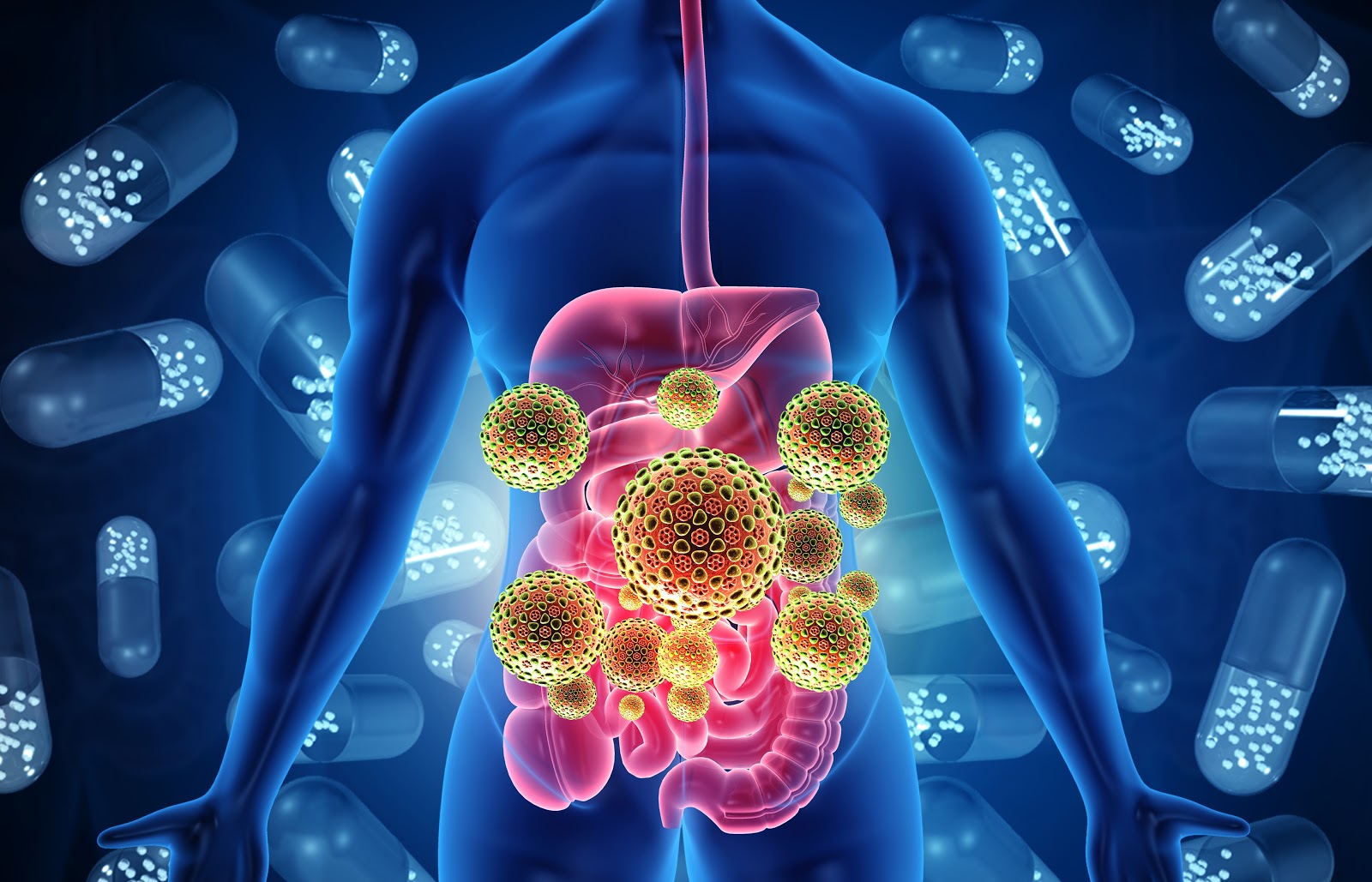What Does Pain in the Thyroid Mean old?
When Should You Worry About Thyroid Pain?

- Which Thyroid Issues Cause Pain?|
- Painful Thyroid Conditions|
- Non-Painful Thyroid Disorders|
- How Thyroid Pain Is Treated|
- Gut Health Can Improve Thyroid Health|
- Bottom Line|
If your thyroid area hurts, this can be an indicator of both serious and benign thyroid problems. The irony of most thyroid conditions is that they don’t cause pain, so when should you worry?
In this article we’ll examine thyroid pain and when to consult your doctor.
Which Thyroid Issues Cause Pain?
Your thyroid gland is a small, butterfly-shaped gland located at the front of the neck that produces hormones.
There are three main reasons your thyroid gland may feel painful:
- Thyroid cancer
- Certain types of thyroiditis
- Very large thyroid nodules
Most other types of thyroid disorders, including autoimmune thyroid disease, goiter, and ordinary thyroid nodules, do not cause pain.

Painful Thyroid Conditions
Thyroid pain can be a symptom of a serious condition, so always consult with your doctor. Here are some reasons for a painful thyroid.
Thyroid Cancer
The most serious cause of a pain in the thyroid gland is thyroid cancer. For this reason, if you are experiencing pain or inflammation of the thyroid gland, you should always consult your doctor.
Thyroiditis
Thyroiditis is by definition an inflamed thyroid gland. Any inflammation is generally painful, but oddly, not all types of thyroiditis cause pain. These types of thyroiditis do cause pain:
De Quervain’s Thyroiditis
De Quervain’s Thyroiditis (also known as subacute granulomatous thyroiditis) is the most common type of painful thyroid inflammation. [1] De Quervain’s Thyroiditis is typically caused by a viral infection. [2] Symptoms can include sinus, dental, or ear pain, fever, and excess thyroid hormone, resulting in hyperthyroid symptoms.
In most cases, De Quervain’s thyroiditis is temporary and will resolve on its own.
Radiation or Trauma-Induced Thyroiditis
Painful swelling in the thyroid gland can be a side effect of radioactive iodine treatment for hyperthyroidism (Graves’ disease) or thyroid cancer. [3] This type of thyroid pain usually only occurs in 1% of people receiving radioactive iodine treatment. [4] Radiation treatment for other types of cancer in the head and neck can also trigger thyroid pain.
Trauma from surgery or fine needle biopsy of the thyroid gland can also cause temporary pain and swelling of the thyroid gland.
Radiation-induced thyroiditis usually resolves on its own in about a month.
Very Large Thyroid Nodules
Most thyroid nodules don’t cause pain, but if a nodule becomes very large, it can cause pain or irritation in the throat, including difficulty swallowing or hoarseness. [5] Thyroid nodules are usually too small to be felt, but if you can feel a thyroid lump or nodule, it’s very important to have your thyroid checked by your doctor.

Non-Painful Thyroid Disorders
The majority of thyroid conditions don’t cause any pain at all. [6] Instead, you would more likely notice the symptoms of hyperthyroidism, including weight loss and palpitations, or symptoms of hypothyroidism, including dry skin, weight gain, and muscle weakness. Here is a summary of non-painful thyroid problems.
Goiter
The thyroid gland needs iodine to produce thyroid hormone. If the thyroid becomes iodine deficient, it swells and enlarges in an effort to obtain more iodine. However, this swelling doesn’t usually cause pain.
Hashimoto’s Thyroiditis
Hashimoto’s thyroiditis (also called lymphocytic thyroiditis) is an autoimmune disease that leads to hypothyroidism (an underactive thyroid). The body’s immune system attacks and damages the thyroid gland, affecting its ability to make thyroid hormones. Despite the fact that the thyroid is being damaged, Hashimoto’s disease usually doesn’t cause pain. [7]
Graves’ Disease
Graves’ disease is an autoimmune attack on the thyroid gland that leads to excessive thyroid hormone levels (overactive thyroid). Graves’ disease causes hyperthyroid symptoms, including feeling jittery or anxious and experiencing a rapid heartbeat. Despite the autoimmune attack on the thyroid, Graves’ disease rarely leads to thyroid pain.
Postpartum Thyroiditis
Some women develop thyroiditis and become hypothyroid during the first year after giving birth. Postpartum thyroiditis doesn’t cause thyroid pain, and usually resolves on its own within 12-18 months.
Thyroid Nodules
Thyroid nodules, which are small, swollen lumps in the thyroid gland, can occur for many reasons, most of them benign. In most cases, thyroid nodules don’t cause noticeable pain. However, a small percentage of thyroid lumps can be cancerous. If you are aware you have thyroid nodules, it’s best to have them evaluated by a doctor.
How Doctors Treat Thyroid Pain
Conventional treatment for a painful thyroid will depend on the cause of the pain.
Typically, thyroid pain is treated with anti-inflammatory NSAIDs like ibuprofen, or corticosteroids like prednisone. If you’re found to have hypothyroidism, you may be prescribed T4 thyroid replacement therapy with levothyroxine.
If you’re diagnosed with hyperthyroidism, beta blockers may be prescribed to reduce symptoms. Anti-thyroid procedures, such as radioactive iodine treatment or even removal of your thyroid gland, may be recommended.
Radioactive iodine treatment permanently damages your thyroid gland to prevent it from producing excess thyroid hormones. Thyroid removal is a permanent solution. Both approaches leave you hypothyroid for life. A much better approach is to treat the underlying cause of autoimmunity to try to preserve your thyroid gland and its function.
Functional medicine treatment for a thyroid condition attempts to address the root causes of your thyroid symptoms. This may include diet and lifestyle changes, as well as treatment to improve your gut health. Often, drastic measures like thyroid removal can be avoided with this approach.
Improving Gut Health May Improve Thyroid Conditions

There’s some encouraging preliminary evidence to suggest that improving your gut can help you improve your thyroid health. Improving the balance of your gut microbiome has been shown in some studies to promote optimal thyroid hormone levels and improve thyroid symptoms. For example:
- In a clinical trial, 8 weeks of probiotic supplementation improved thyroid hormone levels and symptoms compared to a placebo. [8]
- In another study, eliminating H. pylori infection was shown to decrease thyroid antibodies. [9]
So no matter the cause of your thyroid pain, focusing on your gut health may provide improvements in your thyroid condition.
For more information, see The Gut-Thyroid Connection.
The Bottom Line
Pain in your thyroid isn’t necessarily serious, but lack of thyroid pain doesn’t mean you don’t have a thyroid condition. It’s a good idea to have your doctor evaluate you if you’re concerned about your thyroid.
Dr. Michael Ruscio is a DC, natural health provider, researcher, and clinician. He serves as an Adjunct Professor at the University of Bridgeport and has published numerous papers in scientific journals as well as the book Healthy Gut, Healthy You. He also founded the Ruscio Institute of Functional Health, where he helps patients with a wide range of GI conditions and serves as the Head of Research.➕ References
- Rizzo LF, Mana DL, Bruno OD. Tiroiditis no-autoinmunes [Non-autoimmune thyroiditis]. Medicina (B Aires). 2014;74(6):481-492.
- Michas G, Alevetsovitis G, Andrikou I, Tsimiklis S, Vryonis E. De Quervain thyroiditis in the course of H1N1 influenza infection. Hippokratia. 2014;18(1):86-87.
- Mizokami T, Hamada K, Maruta T, Higashi K, Tajiri J. Painful Radiation Thyroiditis after 131I Therapy for Graves’ Hyperthyroidism: Clinical Features and Ultrasonographic Findings in Five Cases. Eur Thyroid J. 2016;5(3):201-206. doi:10.1159/000448398
- Mizokami T, Hamada K, Maruta T, Higashi K, Tajiri J. Painful Radiation Thyroiditis after 131I Therapy for Graves’ Hyperthyroidism: Clinical Features and Ultrasonographic Findings in Five Cases. Eur Thyroid J. 2016;5(3):201-206. doi:10.1159/000448398
- Jonas C, Bertrand C, Michel L, Donckier JE. Painful thyroid nodule, a misleading presentation of subacute thyroiditis. Acta Chir Belg. 2016;116(5):301-304. doi:10.1080/00015458.2016.1147262
- Bindra A, Braunstein GD. Thyroiditis. Am Fam Physician. 2006;73(10):1769-1776.
- Rotondi M, Capelli V, Locantore P, Pontecorvi A, Chiovato L. Painful Hashimoto’s thyroiditis: myth or reality?. J Endocrinol Invest. 2017;40(8):815-818. doi:10.1007/s40618-017-0655-5
- Talebi S, Karimifar M, Heidari Z, Mohammadi H, Askari G. The effects of synbiotic supplementation on thyroid function and inflammation in hypothyroid patients: A randomized, double‑blind, placebo‑controlled trial. Complement Ther Med. 2020;48:102234. doi:10.1016/j.ctim.2019.102234
- Bertalot G, Montresor G, Tampieri M, et al. Decrease in thyroid autoantibodies after eradication of Helicobacter pylori infection. Clin Endocrinol (Oxf). 2004;61(5):650-652. doi:10.1111/j.1365-2265.2004.02137.x
➕ Links & Resources
More on the Thyroid:
- What Does Your Thyroid Do?
- What are Optimal Thyroid Levels?
- Do You Need a Thyroid Detox?
- What Causes Thyroiditis?
- A Low-Iodine Diet May Improve Hypothyroidism
- When Should I Worry About My Thyroid Nodule?
- What Causes Thyroid Nodules to Grow?
- How Long Can You Go Without Thyroid Medication?
- How Should I Use Thyroid Supplements?
- The Gut-Thyroid Connection
- What are Healthy Levels for Thyroid Antibodies?
- Find Your Ideal Thyroid Medication in 4 Simple Steps

Discussion
I care about answering your questions and sharing my knowledge with you. Leave a comment or connect with me on social media asking any health question you may have and I just might incorporate it into our next listener questions podcast episode just for you!